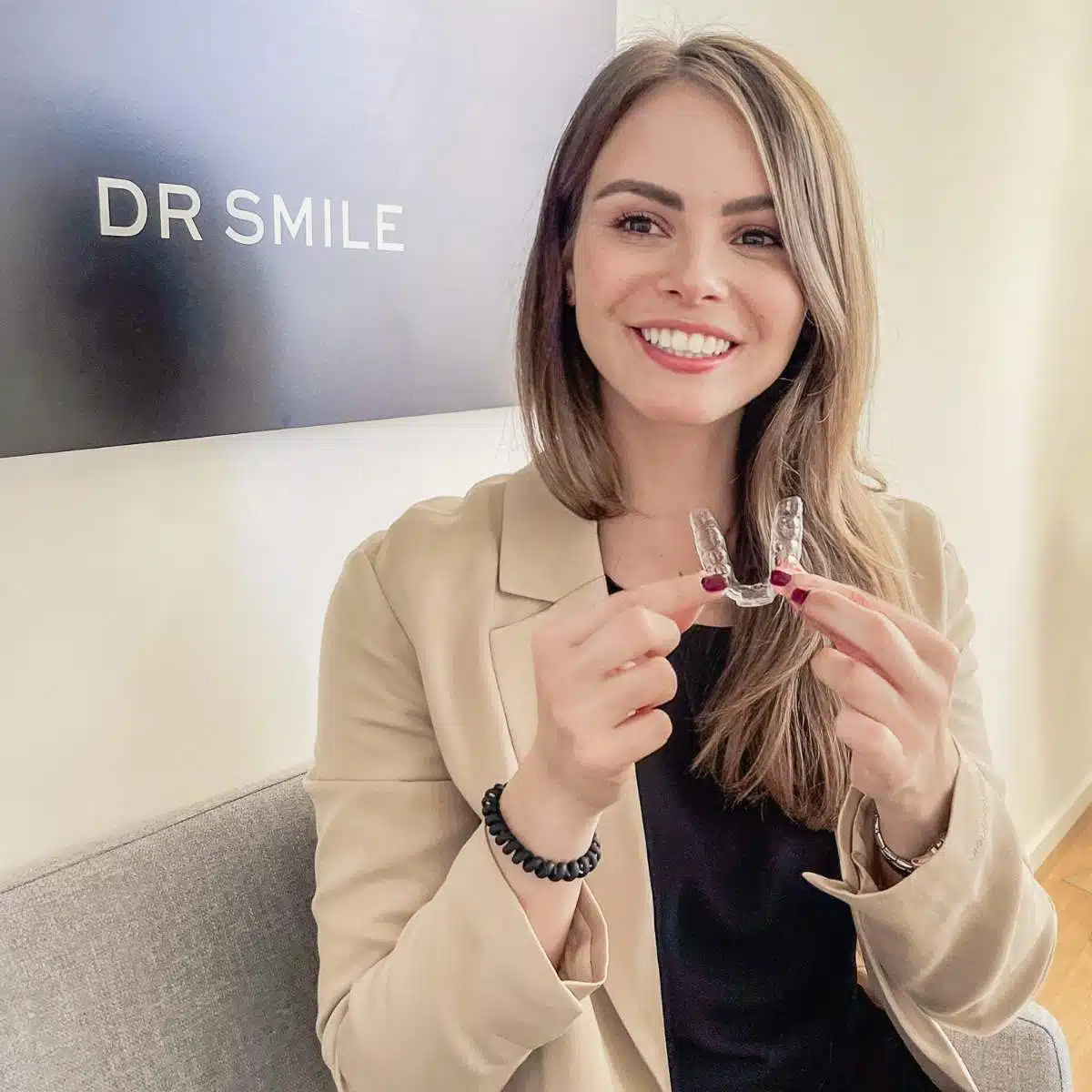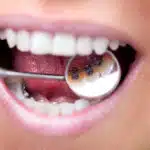For whom is supplementary dental insurance worthwhile? Here you can find out in which cases you can actually save money on expensive dental treatment.
Healthy teeth are crucial for general well-being, but extensive dental treatment can quickly become expensive.
Statutory health insurance often only covers part of the costs for dentures and other dental services.
This is exactly where supplementary dental insurance comes into play. But is this insurance really worthwhile for everyone?
In this article, you will find out for whom supplementary dental insurance makes sense, what benefits are covered and what you should look out for when choosing suitable insurance.
| Get 150 € discount on your dental correction! |

Book a consultation appointment now at a nearby DrSmile partner practice and find out if teeth straightening with aligners is right for you.
The appointment is completely non-binding and does not involve any costs.
With the code “THATSMILE150” you will receive 150 € discount on the treatment.
What is supplementary dental insurance?
Supplementary dental insurance is a private insurance policy that is specifically designed to reduce the co-payments for dental treatment.
It supplements the benefits provided by statutory health insurance and, depending on the tariff, can cover a wide range of treatments, including
- Dentures: crowns, bridges, implants and prostheses.
- Dental treatments: Fillings, root canal treatments and professional dental cleanings.
- Orthodontics: treatments for children and adults, such as braces.
- Prevention: Regular checks and prophylactic measures.
The benefits and reimbursement amounts can vary greatly depending on the insurance tariff. Supplementary dental insurance covers a fixed proportion of the costs, which can generally be between 50% and 100%.

When is supplementary dental insurance worthwhile?
Whether supplementary dental insurance is worthwhile for you depends on various factors, such as your current dental condition, your future treatment needs and your financial means.
In these cases, supplementary dental insurance could be particularly useful:
1. you already have existing dental problems
If you regularly suffer from dental problems or need extensive treatment, supplementary dental insurance may be worthwhile.
Statutory health insurance often only covers basic care, and particularly high-quality materials and methods are generally not covered.
Supplementary dental insurance helps to reduce the cost of high-quality dental prostheses such as ceramic crowns or implants.
However, you must bear in mind that many insurance companies do not cover the costs of pre-existing problems, or only to a limited extent.
It is therefore worth taking out supplementary dental insurance as early as possible.
2. you would like high-quality treatments and dentures
Statutory health insurance usually only covers the costs of standard care.
However, if you value high-quality aesthetic materials and state-of-the-art treatment methods, such as ceramic fillings, implants or inlays, supplementary dental insurance can significantly reduce costs.
Without supplementary insurance, you often have to dig deep into your own pocket for these services. An implant can cost several thousand euros, which you then have to pay out of your own pocket.

3. you attach importance to regular preventive care and prophylaxis
Another advantage of supplementary dental insurance is that it covers the costs of regular prophylactic measures, such as professional teeth cleaning.
Many tariffs cover the costs of one or two cleanings per year. Regular dental prophylaxis is important to prevent tooth decay and gum disease.
With supplementary dental insurance, you can not only save money, but also maintain your dental health in the long term.
4. you have children who need orthodontic treatment
If you have children who need orthodontic treatment, supplementary dental insurance can be very useful.
Statutory health insurance only covers the cost of braces in certain cases and if the malocclusion is severe enough.
In addition, often only simple metal braces are covered, while modern and aesthetic alternatives, such as transparent plastic splints, often have to be paid for by the patient.
Supplementary dental insurance can significantly reduce costs here and allows you to choose the best treatment for your children.
5. you want financial security
Supplementary dental insurance gives you financial security in the event that you need major dental treatment.
Whether you need extensive root canal treatment, a complex prosthesis or an implant – with supplementary insurance you are better covered and don’t have to worry so much about the high treatment costs.
Especially in the event of unforeseen dental problems, you can avoid high co-payments.

When is supplementary dental insurance less worthwhile?
There are also situations in which supplementary dental insurance may make less sense:
- You have healthy teeth and no planned treatments: If you have regular check-ups and no dental problems, the premiums for supplementary dental insurance may be higher than the actual costs you will have to pay for dental treatment in the coming years. Keep in mind, however, that expensive dental treatment can also come up completely unexpectedly.
- You are already at an advanced age: the premiums for supplementary dental insurance can be higher for older people. In addition, many insurance policies do not cover the costs of pre-existing dental conditions or damage. In such cases, you need to check carefully whether supplementary dental insurance is still worthwhile for you.
- Existing extensive dental problems: If you already have numerous dental problems that require extensive treatment, many supplementary dental insurance policies will not cover them or will only cover them to a limited extent. In this case, it may make more sense to invest directly in dentures instead of paying long-term premiums for insurance.
What should you look out for when choosing supplementary dental insurance?
If you decide to take out supplementary dental insurance, there are a few important aspects that you should pay attention to:
- Scope of benefits: Check exactly what benefits the tariff covers. Does it cover all treatments relevant to you, such as dentures, fillings, root canal treatment or orthodontics?
- Reimbursement amount: Find out about the reimbursement amount. Some tariffs reimburse up to 100% of the costs, others only a lower percentage. Also check whether there are maximum amounts per year.
- Waiting periods: Many insurance policies have waiting periods during which no benefits can be claimed. Therefore, consider whether the tariff meets your needs.
- Benefit restrictions: Some insurance policies have benefit limits in the first few years. This means that the maximum reimbursement amount is staggered and only increases over time.
- Exclusions: Read the policy conditions carefully to understand which treatments are excluded or only reimbursed under certain conditions.

Conclusion: For whom is supplementary dental insurance worthwhile?
Supplementary dental insurance can be worthwhile for many people, especially if you value high-quality dental care, already have dental problems or are expecting extensive treatment in the future.
Supplementary dental insurance is also often a sensible investment for families with children who need orthodontic treatment.
It is important to be well informed, to know your own needs and to compare different tariffs in order to find the right insurance.
If you are interested in supplementary dental insurance, it is advisable to take it out as early as possible while your teeth are still healthy.
This means you can benefit from the best services and are optimally covered in the event that major treatment becomes necessary.
| Get 150 € discount on your dental correction! |

Book a consultation appointment now at a nearby DrSmile partner practice and find out if teeth straightening with aligners is right for you.
The appointment is completely non-binding and does not involve any costs.
With the code “THATSMILE150” you will receive 150 € discount on the treatment.
FAQs on the topic of “Manual or electric toothbrush”
Here we answer a few of the most frequently asked questions on the subject of “For whom is supplementary dental insurance worthwhile?”
You can find more information about supplementary dental insurance here.
What exactly is supplementary dental insurance and what benefits does it cover?
Supplementary dental insurance is a private insurance policy designed to reduce the cost of dental treatment.
It supplements the benefits of statutory health insurance and, depending on the tariff, covers various areas such as dentures (crowns, bridges, implants), dental treatment (fillings, root canal treatment), prophylaxis (professional teeth cleaning) and even orthodontic treatment. The exact scope of benefits depends on the tariff selected.
Is supplementary dental insurance worthwhile for people with healthy teeth?
Yes, even if your teeth are currently healthy, supplementary dental insurance can be worthwhile.
Insurance is particularly useful if you want to make provisions in advance in case expensive treatment becomes necessary in the future.
Taking out insurance at an early stage also has the advantage that there are no waiting periods or restrictions for existing dental problems.
You can also benefit from low premiums, which could increase with age or in the event of existing tooth loss.
Does supplementary dental insurance make sense for children?
Yes, especially when it comes to orthodontic treatment. Statutory health insurance only covers the costs of braces in certain cases and for severe misalignments.
In addition, often only simple metal braces are reimbursed, while modern, inconspicuous solutions such as clear plastic aligners usually have to be paid for privately.
Supplementary dental insurance can significantly reduce the cost of high-quality orthodontic treatment and allows you to choose the best treatment for your children.
For whom is supplementary dental insurance particularly recommended?
Supplementary dental insurance is particularly recommended for people who value high-quality dental care, such as aesthetically pleasing dentures (ceramic crowns, implants) or modern treatment methods (inlays).
People who would like to have their teeth professionally cleaned regularly can also benefit from supplementary dental insurance, as many tariffs cover this service.
If you already know that you will be having expensive dental treatment in the next few years, supplementary dental insurance can save you considerable costs.
Does supplementary dental insurance also cover costs for existing dental problems?
Most supplementary dental insurance policies only cover the costs of pre-existing dental problems to a limited extent or not at all.
Before taking out a policy, you usually have to fill out a health questionnaire in which you are asked about your current dental status. If you already have major dental damage, it is possible that this will be excluded from the insurance.
It is therefore advisable to take out supplementary dental insurance as early as possible while your teeth are still largely healthy.
When is supplementary dental insurance less worthwhile?
Supplementary dental insurance is less worthwhile if you have healthy teeth and are not planning any expensive treatments.
In this case, the monthly contributions could exceed the actual costs of the occasional dentist visits.
It can also be difficult for older people who have already undergone many dental prostheses or have extensive dental problems to find suitable insurance that still covers these costs.
How much can you actually save with supplementary dental insurance?
The savings depend on the chosen tariff and the treatments. For example, the cost of an implant including a crown can be several thousand euros.
Statutory health insurance often only covers a small fixed allowance.
Depending on the tariff, supplementary dental insurance can cover 50 % to 100 % of the remaining costs, which can lead to considerable financial relief.
Even with regularly used services such as professional dental cleaning, the savings over the years can be considerable.
How do you choose the right tariff for supplementary dental insurance?
When choosing the right tariff, you should pay attention to which services are important to you.
If you need dentures such as crowns or implants, a plan with a high reimbursement for dentures makes sense. If regular professional dental cleaning is important to you, look for a plan that covers this service.
Also pay attention to possible waiting periods, graduated reimbursement in the first few years and exclusions from certain treatments.
Compare several offers and read the contract conditions carefully to find the tariff that best suits your needs.
Are there waiting periods for supplementary dental insurance?
Yes, many supplementary dental insurances have waiting periods, which are usually between three and eight months.
You cannot claim any benefits during this time. However, some tariffs also offer immediate insurance cover, but these are often more expensive or have reduced benefit coverage in the first few years.
It is therefore advisable to take out supplementary dental insurance at an early stage, before major dental problems occur.
Can you cancel supplementary dental insurance at any time?
As a rule, supplementary dental insurance policies have a minimum term, usually between one and two years.
After this period has expired, you can usually cancel the insurance with a notice period of three months.
Some insurance companies also offer shorter notice periods, depending on the contract.
However, before you cancel an insurance policy, you should carefully check whether you will need such cover again in the future, as taking out a new policy at a later date can often be more expensive.



Leave a Reply